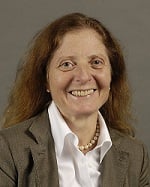Trusted Resources: People & Places
Healthcare providers, researchers, and advocates
Linda R. Dagi, MD
Healthcare Professional Director
Adult Strabismus Service
Boston Children’s Hospital/ Massachusetts Eye and Ear
243 Charles Street
Boston, Massachusetts, United States
Dr. Linda Dagi is the Director of Adult Strabismus at the Boston Children’s Hospital/Mass. Eye and Ear and Associate Professor of Ophthalmology at Harvard Medical School. She has joint appointments at Boston Children’s Hospital and Massachusetts Eye and Ear. Dr. Dagi is also the Director of Quality Assurance, Department of Ophthalmology and Ophthalmology Foundation Chair at Boston Children’s Hospital.
Dr. Dagi has a particular interest and expertise in the treatment of complex strabismus and double vision resulting from cranial nerve palsies, high myopia, and aging of the eyes, as well as thyroid eye disease. She has pioneered the development of a number of novel surgical techniques in this realm.
As a pediatric ophthalmologist, she treats complex strabismus disorders in children, ptosis in children, and provides consultation to the craniofacial service at Boston Children’s Hospital.
Representative Publications:
Thyroid Eye Disease: Honing Your Skills to Improve Outcomes
Acquired Reversible Brown Syndrome Caused by Focal Abscess of the Superior Oblique Muscle
Related Content
-
A New Era in the Treatment of Thyroid Eye DiseasePurpose: Improved understanding of thyr...
-
Graves’ Orbitopathy as a Rare Disease in Europe: A European Group on Graves’ Orbitopathy (EUGOGO) Positi...Background: Graves' orbitopathy (GO) is...
-
Update on Graves’ Disease: Advances in Treatment of Mild, Moderate and Severe Thyroid Eye DiseasePurpose of Review: To report the most r...
-
Preoperative Clinical Features of Reactivated of Graves’ Orbitopathy After Orbital DecompressionPurpose: To investigate the incidence a...
-
Shannon S. Joseph, MD, MScDr. Shannon S. Joseph is a board-certifi...
-
Treatment Options for Thyroid Eye or Graves’ Disease at Ohio Statehttps://www.youtube.com/watch?v=2vcbs9hu...
-
Effects of Treatment Modalities for Graves’ Hyperthyroidism on Graves’ Orbitopathy: A 2015 Italian Society of En...Graves’ disease is the most frequent f...
To improve your experience on this site, we use cookies. This includes cookies essential for the basic functioning of our website, cookies for analytics purposes, and cookies enabling us to personalize site content. By clicking on 'Accept' or any content on this site, you agree that cookies can be placed. You may adjust your browser's cookie settings to suit your preferences. More Information
The cookie settings on this website are set to "allow cookies" to give you the best browsing experience possible. If you continue to use this website without changing your cookie settings or you click "Accept" below then you are consenting to this.




 myBinder
myBinder




 Facebook
Facebook